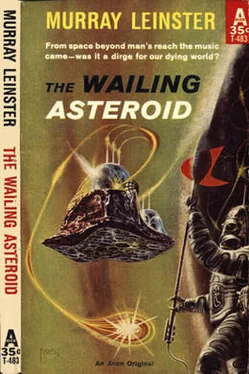It did, but there was violent opposition to the fact.
Publicly, of course, the shock of such an about–face by the national government was extreme. But newspapers flashed new headlines. "U.S. SHIP SPEEDING TO QUERY ALIENS!" Lesser heads announced, " Critical Velocity Exceeded! Russian Probe Already Passed! " The last was not quite true. The Russian manned probe had started out ten days before. Burke hadn't overtaken it yet.
Broadcasters issued special bulletins, and two networks canceled top evening programs to schedule interviews with prominent scientists who'd had nothing whatever to do with what Burke had managed to achieve.
In Europe, obviously, the political effect was stupendous. Russia was reduced to impassioned claims that the ship had been built from Russian plans, using Russian discoveries, which had been stolen by imperialistic secret agents. And the heads of the Russian spy system were disgraced for not having, in fact, stolen the plans and discoveries from the Americans. All other operatives received threats of what would happen to them if they didn't repair that omission. These threats so scared half a dozen operatives that they defected and told all they knew, thereby wrecking the Russian spy system for the time being.
Essentially, however, the recovery of confidence in America was as extravagant as the previous unhappy desire to hear no more about space. Burke, Holmes, Keller, Sandy and Pam became national heroes and heroines within eighteen hours after guided missiles had failed to shoot them down. The only criticism came from a highly conservative clergyman who hoped that other young girls would not imitate Sandy's and Pam's disregard of convention and maintained that a married woman should have gone along to chaperon them.
The atmosphere in the ship, however, was that of respectability carried to the point where things were dull. The lower compartment of the ship, being smaller, was inevitably appropriated by Sandy and Pam. They retired when the ship was twenty hours out from Earth. Each of them had prepared for stowing away by wearing extra garments in layers.
"Funny," said Pam, yawning as they made ready to turn in, "I thought it was going to be exciting. But it's just like a rather full day at the office."
"Which," said Sandy, "I'm quite used to."
"I do think you ought to have barged in when they designed the ship, Sandy. There's not one mirror in it!"
In the upper compartment Keller took his place in the control–chair and took a trick of duty. It consisted solely of looking at the instruments and listening to the beeping noises which came from remoteness every two seconds, and the still completely cryptic broadcasts which came every seventy–nine minutes. It wasn't exciting. There was nothing to be excited about. But somebody had to be on watch.
On the second day out, Washington was ready to use the new code. The West Virginia radar bowl was powered to handle communications again. Sandy painstakingly took down the gibberish that came in and decoded it. From then on she worked at the coding and transmission of messages and the reception and decoding of others. Presently Pam relieved her at the job. Pam tended to be bored because Holmes was as much absorbed in the business of keeping anything from happening as was Burke.
The messages were almost entirely requests for, and answers to requests for, details about the ship plans. The United States had not yet completed a duplicate drive–shaft. Machinists labored to reproduce the cores, which would then have to be wound in the complicated fashion the plans described. But it was an unhappy experience for the scientific minds assigned to duplicate Burke's ship. No woman ever followed a recipe without making some change. Very few physicists can duplicate another's apparatus without itching to change it. There were six copies of the drive under construction at the same time, at the beginning. Four were made by skeptics, who adhered to the original plans with strict accuracy. They were sure they'd prove Burke wrong. Two were "improved" in the making. The four, when finished, worked beautifully. The two doctored versions did not. But still there was fretful discussion of the theory of the drive. It seemed flatly to contradict Newton's law that every action has a reaction of equal moment and opposite sign—a law at least as firmly founded as the law of the conservation of energy. But that had lately been revised into the law of the conservation of energy and matter, which now was gospel. Burke's theory required the Newtonian law to be restated to read "every action of a given force has a reaction of the same force, of the same moment," and so on. When the reaction of one force is converted into another force, the results can be interesting. In fact, one can have a space–drive. But there was bitter resistance to the idea. It was demanded that Burke justify his views in a more reasonable way than by mere demonstration that they worked.
After a time, Burke gave up trying to explain things. And when one and then another duplicate drive worked, the argument ceased. But eminent physicists still had a resentful feeling that Burke was cheating on them somehow.
Then for days nothing happened. One of the three men in the ship always stayed in the control–chair where he could check the ship's course against the homing signals from the asteroid. He might have to correct it by the fraction of a hair, or swing ship and put on more drive if the radar should show celestial debris in the spaceship's path. Every so many hours the ship had to be swung about so that instead of accelerating she decelerated, or instead of decelerating gained fresh speed. But that was all.
On the fifth day there was the flash of a meteor on the radar. On the seventh day an object which could have been the second or third unmanned Russian probe showed briefly at the very edge of the radar screens. In essence, however, the journey was pure tedium. Burke wearied of making sure that his work was good, though he congratulated himself that nothing did happen to break the monotony. Holmes admitted that he was disappointed. He'd wanted to make the journey because he'd sailed in everything but a spaceship. But there was no fun in it. Keller alone seemed comfortably absorbed. He prepared daily lists of instrument–readings to be sent back to Earth. They would be of enormous importance to science–minded people. They were not of interest to Sandy.
Even when she talked to Burke, it was necessarily impersonal. There could be no privacy which was not ostentatious. The two girls used the lower compartment, the three men the upper and larger one. For Sandy to talk privately with Burke, she'd have had to go to the small bottom section of the ship. Holmes and Pam faced the same situation. It was uncomfortable. So they developed a perfectly pleasant habit of talking exclusively of things everybody could talk about. It did not bother Keller, who would hardly average a dozen words in twenty–four hours, but Sandy muttered to herself when she and Pam retired for what was a ship–night's rest.
When they went past the orbit of Mars, agitated instructions came out from Earth. The asteroid belts began beyond Mars. Elaborate directions came. The ship was tracked by radar telescopes all around the world, direction–finding on its transmission. Croydon kept track. American radar bowls picked up the ship's voice. South American and Hawaiian and Japanese and Siberian radar telescopes determined the ship's position every time a set of code symbols reached Earth from the ship. Of course, there were also the beepings and the seventy–nine–minute–spaced identical broadcasts from farther out from the sun.
Somebody got a brilliant idea and authority to try it. An interview for broadcast on Earth was sought with somebody on the ship. It was then a hundred thirty million miles from Earth, and ninety–two million more from the sun. Largely out of boredom Sandy agreed to answer questions. But at the speed of light it required eleven minutes to reach her from Earth, and as long for her reply to be received. It did not make for liveliness, so she spoke curtly for five minutes and stopped. She talked at random about housekeeping in space. Without knowing it, she was praised for her domesticity in many pulpits the following Sunday, and eight hundred ninety–two proposals of marriage piled up in mail addressed to her in care of the United States government. Twelve were in Russian.
Читать дальше







